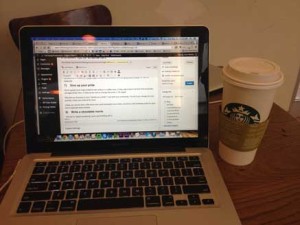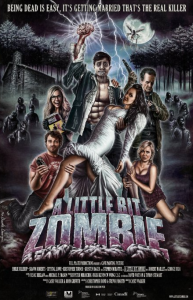
Those who read about screenwriting often bump up against the same group of tips/rules time and time again. This time around, as we wrap up phase 2 of our NSI Features First program, I’ve punched out a new draft of Synapse and I’d like to share some things I’ve learned that AREN’T those same old boring (but of course important!) rules.
1) Scripts are read, not watched.
We’ve all been taught the wrong thing about who we’re writing our script for. Some “experts” say you’re making a blueprint for your film, so a script is really a visual medium. That’s true to an extent, but we as screenwriters must remember that your script will be read, not watched.
Yes, it’s important that our readers can picture the movie in their heads as they go, but your script isn’t a movie. Sounds obvious, but it draws attention to a few key points:
Sometimes you can’t leave elements for the director/art department to design. Some things have to be described in great detail for the reader to be able to picture it properly, or it can distract from the story. Inserting these descriptions can be tricky for your flow and pacing, but are occasionally necessary, so be sure to think carefully about what you’re leaving out.
Watch out for your verbs. A lot of characters “look” and “walk” in screenplays. That’s fine, but be sure to inject some colour into your vocabulary. Not only will that make it a more entertaining read, but it can actually serve you well in developing characters (ie. a “glance” is very different than a “look”).
2) Read Your Script Out Loud, By Yourself
Before you’re finished a draft, this is a crucial step. It will feel silly. You’ll want to stop immediately. Don’t. Reading every word out loud will help you find typos, run-on sentences, incorrect scene headings, poor sentence structure, etc.
3) Scrutinize each scene individually
Flow and pacing is important, but don’t forget each scene should be able to stand on its own. I like to take my scenes out of story order, read them by themselves and ask the following questions:
- Is this scene absolutely essential? (if not, scrap it or improve it)
- Is this scene entertaining?
- What is this scene doing to progress the A-plot?
- What is this scene doing to progress the B-plot?
- What is this scene doing to develop the characters?
- Is this scene showing, not telling?
- Does this scene have a beginning/middle/end? Does it need one?
- What is this scene’s “button”? What makes it interesting?
- Is there tension?
- Am I holding onto this scene only because I like it? (you’d be surprised how often the answer is “yes”).
The best scenes can address all of these at once. Try to “layer” your scenes to ensure they’re working on as many levels as possible. Believe it or not, you can advance several plots, characters and themes at the same time, all while entertaining your audience!
4) Explore Your Discipline
Some writers need a completely distraction-free environment to write. Others need ambient noise. Some are most creative at 5:30am, others at 11:30pm. Some can’t write without coffee, others can’t write with it. Some can only write with a strict deadline, others can’t find the creativity under pressure.
There’s nothing wrong with any of these, the trick is to find out what works best for you. I’ve been writing professionally for over 6 years, so I’ve had time to experiment with different conditions, as well as learn to focus on writing in different environments. Test yourself, try writing someplace/sometime different. You might find you’re more creative in the car, at the mall, in the shower. Don’t fight these things and assume you have to be at a desk from 9-5 to write properly, explore your discipline and embrace it!
A random key thing for me is to treat myself WHILE I’m writing, not afterwards. Some people hold off on simple pleasures until their “chores” are done, which totally may work for them. But I find if you make the act of writing the treat, you’ll enjoy it more and will find focus easier.
5) Don’t be afraid of the cliché
Nobody wants clichés in their screenplays, but sometimes they serve a purpose. Sometimes they’re the best way to communicate something instantly (yes, that guy with the hooked nose is evil). Sometimes they’re a great way to get your story on the page (you can always come back to that moment). And sometimes they’re a great way to challenge your audience’s expectations and surprise them.
Once your story is finished, then it’s time to go through and do a “cliché check”. Analyze every beat and, if it’s a cliché and is going to distract your audience or lose their suspension of disbelief, figure out a way to tweak it or turn it into something new.
6) Use the internet to your advantage
Read news stories to inspire your characters, explore memes to get your funny bone working, check articles for tips and tricks. The tools of screenwriting are all psychological, and you have the world of information at your fingertips. Exploit it to death!
My favourite tools are TV Tropes, Celtx (Scriptwriting Software) and the Scriptnotes Podcast. All free, All awesome.
7) Give up your pride
Some people have huge problems with writing in a coffee shop, or they worry about how their first screenplay will pigeonhole them, or they try too hard to change the world in 120 pages.
Why are you focusing on your “identity as a writer”? Just write your screenplay. Put all of your energy into your product, check your pride at the door.
(Okay you should care a little about your public perception as a writer, but that’s a self-marketing article for later and a separate issue entirely).
8) Write a shootable movie
This isn’t a “dream squashing” point, but it’s flirting with it.
If this is your first screenplay, or you’re in Canada, or…basically if you’re reading this post, you will not be able to get a $400M movie made. Not yet. The more affordable your movie is, the more likely it will get made, the more likely you’ll have a 2nd, more expensive movie — see where I’m going with this?
Synapse is well-positioned because it’s a sci-fi (genre films have an easier time finding an audience) and it’s shootable. That’s not an accident. Making it affordable was a conscious decision while I was writing. You should make these decisions too.
Do you need explosions? Do you need a dragon?
If the answer to expensive questions is ever “yes”, then keep writing your screenplay, but be aware that it’s likely not the first movie you’ll make.
Hope those tips were useful! If you have any questions, fire away in the comments, or get in touch on Social Media.
Happy writing!
ShareMAY





About the Author:
Scott Westby is a Writer, Director and Producer in Calgary's film industry. He's a 2008 graduate of SAIT's Film & VIdeo Production Program, and has years of experience in strategic marketing and content creation for traditional and new media. A Taco/Slurpee enthusiast and a hater of mushrooms.